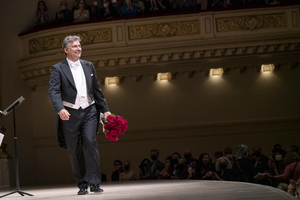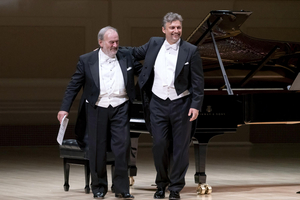Review: Well, Hello, Jonas, It's So Nice to Have You Back Where You Belong (New York, That Is)
Carnegie Hall Ended Its Opening Week with an Enchanting Concert by Jonas Kaufmann

The opening lines of Jonas Kaufmann's lieder concert at Carnegie Hall Saturday night, weren't exactly ones that fill the heart with joy: "My songs are filled with poison--why shouldn't that be true? Into my budding manhood, you poured your poison through." (Draper's translation from Heine.) But to have Kaufmann back in New York was a wondrous thing. And he gave us plenty to be thankful for.
Sure, there were petty annoyances (late arrivals, phone videos, etc.) and they may have disrupted the flow of the evening--and gotten under the skin of the tenor--but for the rest of us, it was a pretty magical time. With his longtime accompanist and compatriot, Helmut Deutsch, on piano, he filled the evening with song, lieder.
And the printed program, filled with works by Liszt, Schubert, Mozart, Schumann, Schubert, Dvorak, Brahms, Bohm, Chopin, Tchaikovsky, Strauss, Zemlinsky, Wolf and Mahler only got him started. There were another half dozen encores, including some of the most familiar works for this kind of program. The songs by Strauss, Wagner, Schumann and Schubert left the audience dizzy with admiration. It was voice, voice and more voice, but always completely as one with pianist Deutsch.
Even those of us who would rather hear him in an opera than in this repertoire, could hardly gripe about the quality of his instrument, his strong connection to the material, the loving way he caressed the music. The way he modulated his voice not just from song to song but from measure to measure was a marvel of his performance skill.

© Jennifer Taylor
For example, in one of his earlier pieces, Liszt's "Freudvoll und leidvoll II," S. 280/bis. The change from the forceful rendition at the start of the first go-around to the almost-whisper of the second, was just stunning. His ability to change dynamics on a dime, as in Liszt's "Ihr Glocken von Marling," was ravishing, as was his skill in going from volume of almost Wagnerian force to a sweetness--as at the conclusion of Liszt's "Loreley"--that left us staggering.
As I mentioned earlier, his connection to the pieces allowed him to clearly differentiate between the light and cheery Schubert "Die Musensohn" and very Mozartean Mozart "Das Veilchen," which might have come from one of the master's opera. In Schumann's "Widmung," he sang as if each word was a pearl for him and Zemlinsky's "Selige Stunde" (one of the songs on his "Romantic Songs" disk) was so soft and tender that it was a heart-breaker.
There were many songs that were old friends--Dvorak's "Als die alte Mutter" ("Songs my mother taught me"), Brahms's "Wiegenlied" ("Lullaby"), Strauss's gorgeous "Zueignung," "Morgen" and "Cecilie," the soothing "Traume" from Wagner's Wesendonck Lieder and Schubert's jaunty "Die Forelle."
With the many encores, it felt like the concert could go have gone on forever--which would have been just fine with the Carnegie Hall audience, myself included.
Reader Reviews
Videos

